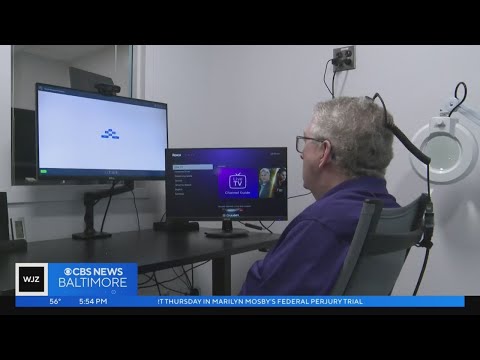The Johns Hopkins Department of Neurology is recruiting participants for a clinical trial investigating an implantable brain-computed interface (BCI) to help improve communication for patients with muscular weakness from ALS, brainstem stroke and other causes.
Questions? Contact us:
By Email
By Phone
Investigation on the Cortical Communication (CortiCom) System
This clinical trial aims to evaluate the safety and preliminary effectiveness of the CortiCom system, a BCI consisting of thin sheets of up to 128 electrodes surgically implanted on the surface of the brain. The CortiCom device records and carries brain signals to be processed into computer commands, text or speech. To learn more about the CortiCom Study, email hopkinsbci@jh.edu or call 410-955-6772.
Details
The CortiCom Study will involve:
- Surgery to implant the CortiCom investigational device
- Training to operate the BCI up to 4 hours a day, three days a week at The Johns Hopkins Hospital
The study will initially last six months, but may be extended up to four years based on progress.

Eligibility
- 22 to 70 years of age
- Normal cognition
- Communication impairments due to muscle weakness resulting from ALS, brainstem stroke, or other neurological causes, including Locked-In Syndrome (inability to move or speak due to paralysis)
- No contraindications for surgical implantation of the study device
About Our First Study Participant
Johns Hopkins researchers use brain-computer interface to improve lives of ALS patients (WJZ)
Creating more independence for those living with ALS (InvestigateTV)
News and Publications
Research Publications
- A click-based electrocorticographic brain-computer interface enables long-term high-performance switch scan spelling | Nature Communications Medicine
- Online speech synthesis using a chronically implanted brain–computer interface in an individual with ALS | Nature Scientific Reports
- Stable Decoding from a Speech BCI Enables Control for an Individual with ALS without Recalibration for 3 Months | Advanced Science
- Iterative alignment discovery of speech-associated neural activity | Journal of Neural Engineering
- Longevity of a Brain–Computer Interface for Amyotrophic Lateral Sclerosis | New England Journal of Medicine
Study in the News
- Johns Hopkins Researchers Use Brain-Computer Interface to improve lives of ALS patients | WJZ (Video)
- Brain-Computer Interface Restores Control of Home Devices for Johns Hopkins Patient with ALS | Johns Hopkins Medicine
- Man with ALS controls devices using brain-computer interface | ALS News Today
- Restoring Lost Speech | New England Journal of Medicine (Intention to Treat Podcast)



